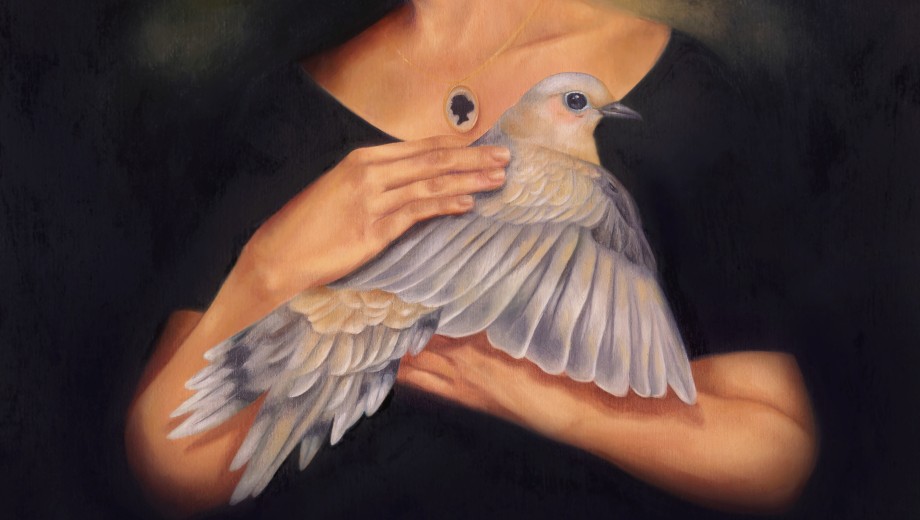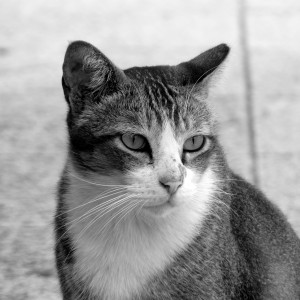Animal studies, described by a 2009 Chronicle of Higher Education article as “a force to be reckoned with in philosophy, literary and cultural studies, history, and other fields with a traditionally humanistic bent,” is nonetheless difficult to define.
Here’s an attempt: animal studies focuses on the interaction of humans and animals while questioning anthropocentric bias.
As for origins, some scholars point to Peter Singer’s Animal Liberation or Carol Adams’s “The Sexual Politics of Meat” (both from 1975) as starting points; others look to Jacques Derrida’s 2008 essay “The Animal That Therefore I Am (More to Follow).”
Two UChicago scholars—Heather Keenleyside and Joela Jacobs—spoke to Tableau about animal studies as an emerging discipline. They described their research, teaching, and conversations in the field—and explained why writing about dogs does not require you to have one.
*****
 Heather Keenleyside, AM'03, PhD’08, Assistant Professor in English Language and Literature, has taught at UChicago since 2008. Her book Animals and Other People: Forms of Life in Eighteenth-Century Literature is forthcoming.
Heather Keenleyside, AM'03, PhD’08, Assistant Professor in English Language and Literature, has taught at UChicago since 2008. Her book Animals and Other People: Forms of Life in Eighteenth-Century Literature is forthcoming.
My work centers on animals in the literature and philosophy of eighteenth-century British writing. In some ways, this is an old topic. There’s a lot of existing work on fables and symbolism, in which animals stand in for something else. Women poets use animals to figure their own constricted possibilities; animals also come into debates around slavery. My interest—and the interest of animal studies—is to get out from under that familiar analysis and wonder what these writers might have actually known about animals.
My interest started when I was living in London in 2001. I was struck by what a national trauma the foot and mouth crisis was in Britain. Around the same time I read J. M. Coetzee’s Disgrace, which is about political problems in South Africa but centers on dogs. Coetzee has been very influential in animal studies.
Animal studies at the time didn’t really exist. I remember writing my proposal to get into graduate school and my adviser saying, “Well, no one will accuse you of being fashionable.” I was here for a couple of years, and suddenly animal studies became a thing.
Right now the field of animal studies is messy and in formation. At UChicago we have a really great interdisciplinary workshop, but the membership doesn’t really extend to the biological sciences. At some universities, animal studies is centered on the hard sciences and includes only a few token ethicists from the humanities. The terminology also hasn’t been settled yet: “critical animal studies” versus “animal studies” versus “animality studies.” The fractures matter to some people but not others.
I teach two animal studies courses. The Lives of Animals covers eighteenth-century literature and philosophy with some contemporary theory. One of the big narratives about animal studies turns on Descartes. He’s the bad guy; the oversimplified version of his work is that animals are just automatons. We also cover what was a flourishing genre in the eighteenth century: the life stories of all kinds of animals and inanimate objects. It reads like children’s literature now, but it didn’t start out that way.
My other course, The Animal: Theories of Nonhuman Life, is not historically specific. I’ve taught everything from Virginia Woolf’s Flush, her biography of Elizabeth Barrett Browning’s spaniel, to films like Sam Fuller’s White Dog, about a dog who’s trained to attack black people and the black trainer who tries to untrain him. It’s clearly allegorical but disturbing and pulpy, and students don’t know what to make of it.
I didn’t grow up with animals at all; I’m uncomfortable around them. I like cats but am very allergic. I wrote an essay a couple of years ago for a semi-academic journal, and the editors really wanted me to frame the argument with my personal experiences with animals. That’s not the way into this for me.
*****

Joela Jacobs, a graduate student in Germanic Studies, is working on her dissertation, “Speaking the Non-Human: Plants, Animals, and Marginalized Humans in Literary Grotesques from Oskar Panizza to Franz Kafka.”
My dissertation, which I’m just wrapping up, is on authors of grotesque short prose around 1900. These authors look to nonhuman figures—plants, animals—and to marginalized human figures to understand what it means to be a human in the modern world. It’s a shift of perspective that allows them to show how human behavior can be grotesque and also to avoid censorship. They used plants to talk obliquely about homosexuality, for example.
While working on this literature I realized I had to think more about plants and animals. I discovered animal studies around 2011 and, some time later, that there were other people doing it at UChicago—in English, Classics, the Divinity School. So we formed a reading group to try to tackle the field together. We read Genesis, Darwin, Kafka. Eventually the reading group became a workshop and began to invite speakers.
There have been a lot of people working on animals on their own for a really long time. When I’m asked if animal studies is the latest fad in academia, I can point to this history. But if you read texts from 10 or 12 years ago, you can notice that the writers hedge a lot more, that they explain why they’re doing what they’re doing. In more recent texts, that doesn’t happen as much. There’s the consciousness of a discipline.
Last spring I helped organize a conference, Why Do Animal Studies? We felt like that question hadn’t been asked by animal studies scholars, whereas people outside the field ask us all the time. We had over 60 paper submissions, the majority of them from faculty, and more than 90 people registered to attend.
Animal studies has various corners, which all have their own answers to that question of why. The ethical approach is the most clear: we need to take better care of animals, be it as companion species or other species next to humans. For someone like me who does literary animal studies, the question is much harder. I would say looking through someone else’s eyes is always an enlightening exercise. The way we represent animals tells us a lot about the human relationship to others and to ourselves.
The University of Chicago Press is actually working on a book of critical terms for animal studies, and the members of our workshop met with them about it. It was really interesting to center in on a term and discuss it. Wild, for instance. Are there even wild animals anymore? Is wild pejorative?
My colleagues in other fields sometimes assume animal studies people must all be vegan, have pets, or work for animal shelters. And some do. In the workshop we have a wide range of ethical and political commitments to animals. The lines are more complicated and blurred than one might expect.
I have a cat, but I write about dogs, which confuses people—and they always ask. It’s something that happens in a lot of disciplines—the assumption that men can’t do gender studies, or Christians can’t do Jewish studies. I think it’s healthy to have a little bit of a distance, though I probably would know more about dogs if I had one. I’d have different kind of knowledge.



Comments
really?
This is why I found my UofChicago education so very annoying... of all the world's problems right now we are paying professors to write about animals in literature?? And then we complain about the price of education... I can imagine that all of 3 people in the world care about this topic.. I was hoping the article would be about vegans or animal rights activists or maybe some that even had a pet... ugh
animal studies
I found the "rant" posting about animal studies to be a perfect example of just WHY "all the world's problems" continue to exist. We can learn much from animals both in life and in literature. And perhaps it would help us face the fact that for all of our religions and governments and other "institutions" we are only animals at our deepest level of existence. And by the way "all the world's problems" aren't caused by animals, they're caused by humans who will never understand or control their own behavior because they don't consider animals worthwhile except as something to be exploited. An open-minded study of animals would reveal that many of our own behaviors are animal instincts, often at their worst.
And I don't write this as a "tree hugger" or "save the planet" type, I've been involved in business for over 50 years, as employee, executive and owner. To me this is common sense (not too common I'm afraid).
Keep up the animal studies!
So another rant . . . sorry!
the lack of sciences in this group at the College
Given the long history of work with (and, more obviously, on) animals at the college, I'm a little surprised the hard sciences and psychology people aren't in the group. Here's hoping more of the biology, psychology and even anthropology/history types get in on the scene soon. You can learn a lot from a well-designed study.
It is interestingly odd that the people in the group aren't more into pets/work animals. Thence cometh the focus on metaphor and symbolism, perhaps?
Late to the conversation, but small clarifications.
As a student of Heather's, colleague of Joela's, and one of the two coordinators of the Animal Studies workshop at UChicago, I wanted to chime in and expand a little. Happily, we have a strong contingent of regular members from Anthropology, Comparative Human Development, and Sociology. Our kick-off meeting this year was with Don Kulick, an anthropologist. Historians, too, are consistent faces at the workshop, and we're lucky to have James Hevia from the History faculty as a regular member. Our upcoming presentation is from a two-person team of anthropologists who are presenting the results of a study they recently completed. There are more than 15 years experience in animal welfare/advocacy between the two current coordinators, although that's not an identifying mark of the workshop. And while not everyone in the workshop is a "pet person" or advocate, one would nearly need an ark to house the many creatures that live with regular members.
That's all to say it is a real mish-mash of disciplines, and that's part of why I think it has retained a strong following. The cross-disciplinary conversations are pretty great. Speaking frankly, it has been a struggle to find ways of talking between the hard sciences and humanities/social sciences. You're right to identify that, and it's something that's really been front-of-mind for us.
The workshop is open to the public! Interested folks might want to check out our schedule for upcoming talks: http://cas.uchicago.edu/workshops/animalstudies/schedule/
the lack of sciences in this group at the College
I very much agree, and would particularly emphasize the desirability of inviting biologists into this group.
"At UChicago we have a really great interdisciplinary workshop, but the membership doesn’t really extend to the biological sciences", is indeed unfortunate. You could learn a great deal from many biologists at the University of Chicago; for a small start, take a look at Jerry Coyne's blog http://whyevolutionistrue.wordpress.com/